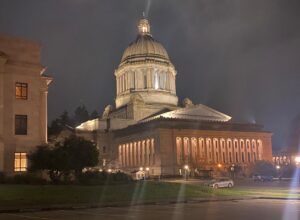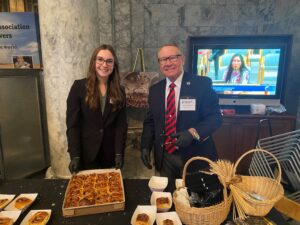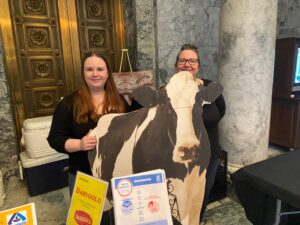
Notes From Olympia: Jan. 27, Week 3 of the 2023 Legislative Session
This edition includes highlights of the week, new legislation introduced, trivia and helpful resources.
 Washington State Capitol Building
Washington State Capitol Building
(Photo Credit: Erica Hallock)
Trivia!
In 1954, the Washington State Supreme Court narrowly ruled in favor of a group of Olympia businesspeople who sued the state for what reason?
Highlights of the Week
Capital Gains Tax Oral Arguments Commence. On Jan. 26, Crosscut published a thorough review of the capital gains tax background and issues, including a bit about the expected timeline of the Supreme Court’s actions.
Unexpected Free Food Giveaway. One of the best ways to turn a Monday frown upside down is the offer of free, warm cinnamon rolls. People throughout the Capitol campus were downright giddy to learn the Washington Association of Wheat Growers was on campus with smiles and offers of warm cinnamon rolls. The rolls, coupled with Wednesday’s Dairy Day giveaway, helped many a Capitol dweller through another long week.
 Cinnamon Roll Station
Cinnamon Roll Station
(Photo Credit: Erica Hallock)
Of course, Dairy Day did not disappoint. Along with the expected ice cream, they offered chocolate milk and selfie-inviting cut-out cows!
 Dairy Day Selfie Station
Dairy Day Selfie Station
(Photo Credit: Erica Hallock)
New Legislation Introduced this Week
As we near the end of week three and approach the Feb. 17 policy cutoff, the introduction of new bills has slowed a bit and committees are squarely focused on bill hearings and executive sessions (a fancy term for votes on bills).
Please check out Start Early Washington’s bill tracker on our State Policy Resources page for a more complete listing of early learning-related legislation and their status. Below is a summary of some bills in play. Inclusion is not meant to indicate Start Early Washington’s position, but instead meant to provide a flavor of issues under consideration.
HB 1451 (Senn). HB 1451 directs OSPI to create the Child Care Worker Pilot Program that will provide high school students credit for working in and exploring pathways in early childhood education programs. The bill also creates a grant program to support technical assistance for new child care providers, directs DCYF to create a web-based manual for youth caring for younger siblings when parents are not home, and calls for the expansion of the substitute pool.
HB 1511 (Reeves). HB 1511 ends the use of social security benefits, social-security income, and child care support as income for families applying for child care subsidy or ECEAP. This bill supports low-income families that may have limited work capacities such as parents with disabilities and single parents.
HB 1550 (Santos). HB 1550 creates the “Transition to Kindergarten” program administered jointly by the Department of Children, Youth, and Families (DCYF) and the Office of Superintendent of Public Instruction (OSPI). The bill outlines state agency, school district, and program rules and requirements as well as plans to convert existing “Transitional Kindergarten” programs to this new program.
Following are some key components:
Funding
- Removes basic education funds as the primary funding source for the program and designates the source as State General Fund. Also explicitly removes the ability to fund the program with basic education dollars.
- Requires the program to be free of charge to eligible children.
- State funding for the program must be based per enrolled eligible child and must not be higher than the amount per child allocated by the legislature for ECEAP.
Eligibility
- Program eligibility must be coordinated with existing early learning providers. Eligibility requirements include:
- Children on an ECEAP waitlist, but not yet enrolled in an ECEAP program.
- Children screened as needing additional preparation before entering kindergarten (screening process must be submitted to the state).
- Children that have not participated in a formal early learning program.
- Children with families earning up to 100% of the State Median Income adjusted for family size.
Program Administration
- The “Transition to Kindergarten” program would be jointly administered by OSPI and DCYF.
- Programs would be authorized by school districts and program sites would be limited to common schools.
- Districts applying for the funds must:
- Describe the process to determine if a child needs support from the “Transition to Kindergarten” program.
- Outline recruitment and enrollment plans with early learning providers in the school catchment area.
- Wait one year between application submission and the program’s start date.
- Describe the assessment tools used to screen children for program eligibility.
- Outline a plan for coordination with existing early learning providers.
- Not deny entry to the program based on a student’s disability.
- Provides OSPI administrative responsibility for parts of the program, including:
- Providing eligibility and enrollment data.
- For the 2024-25 school year, prioritizing program funding to districts currently offering “Transitional Kindergarten.” These program dollars are subject to the availability of funding appropriated for this specific purpose.
- Requiring OSPI to work with DCYF on program monitoring, quality and teacher certification.
- Directing school districts to work with the existing early learning provider ecosystems in their catchment area.
- School districts must have their programs reauthorized every five years and districts must notify the state if any program discontinues one year before closure.
- Clarifies DCYF has monitoring and rule-making authority.
- Requires OSPI and DCYF to develop a plan to convert existing “Transitional Kindergarten” programs to the new “Transition to Kindergarten” program outlined in this bill.
Program Standards
- Requires school districts with the “Transition to Kindergarten” program to participate in Early Achievers.
- Requires alignment of the “Transition to Kindergarten” program licensing standards to child care and ECEAP licensing standards and the use of developmentally appropriate curricula.
- Requires each program to be staffed with a teacher holding a valid Washington teacher certificate with either an early childhood education endorsement or an early childhood special education endorsement.
Senate hearing on Working Connections Child Care Bills. On Wednesday, Jan. 25, the Senate Early Learning and K12 Committee held public hearings on several child care and early learning-focused bills. The committee heard SB 5225, which would: 1) increase access to child care by authorizing care for families involved in therapeutic court; 2) prohibit the Department of Children, Youth and Families from considering the immigration status of a full-time student parent enrolled in certain education programs applying for Working Connections Child Care; and 3) authorizes child care subsidy eligibility for dependents of child care employees with incomes up to 85% of State Median Income. Senators heard from parents directly impacted by the current policies, including a parent who had to leave her job at a preschool due to the cost of child care for her own child.
The committee also heard SB 5316, which eliminates the requirement for applicants of child care and foster care entities to pay state and federal background check fees.
Finally, the committee heard SB 5423, which provides qualifying applicants and consumers of state registered apprenticeship programs eligible for the Working Connections Child Care subsidy. A parent and ironworker apprentice described how trade apprenticeships are a great pathway to family financial stability and how unreliable and unaffordable child care can be a barrier.
Bill Tracker: Key Early Learning Bills
As the legislative session progresses, our resource page will update with a weekly bill tracker. Please note that legislation changes quickly, so the version on our website may not represent a bill’s latest version as it is published the Thursday of each week.
Trivia Answer
Given the level of construction on the campus this year, much of the trivia will revolve around buildings, including this week.
In 1954, the Washington State Supreme Court, in a 5-4 decision, ruled in favor of Olympia businesspeople that state agency headquarters must be based in Olympia.
Shortly after the designation of Olympia as the State Capitol in 1853, a number of state agencies settled outside of the capital city, largely in Seattle. This re-location of state agencies intensified following World War II and by the mid-1950s, 13 state agencies were housed in Seattle.
In its decision, the majority wrote, “We feel certain it was the intention of the framers of our state constitution and the people … that the whole of the executive department should be located in the seat of government.” However, in their written dissent, four justices countered this question as one for the Washington State Legislature, rather than the court.
As Olympia began to run out of office space (a topic for a future trivia item), state agencies began to expand into neighboring Tumwater and Lacey. So far, we have not seen any legal challenges from 21st century businesspeople in Olympia that this violates the spirit of the Washington State Supreme Court precedent.
Post-COVID, the question of how much office space state agencies need is timely as many state agency staff continue to work remotely. (This is also a question with budget implications as state real estate is not an inconsequential expense). Additionally, we are seeing state agencies build their footprints with offices located throughout the state to help ensure their staff lives in and knows their community.
Source: History Link
About the Author

Erica Hallock
Director, Policy & Advocacy, Start Early Washington
Erica Hallock serves as the Director of Policy and Advocacy for Start Early Washington. She has worked in early childhood, health and human services policy in both California and Washington state.
More Like This
Contact Us
Connect with our team to learn more about our work or discuss how we can support policy and advocacy work for your organization.
Washington State Hub
Learn more about our work in Washington state and access relevant resources and publications.
